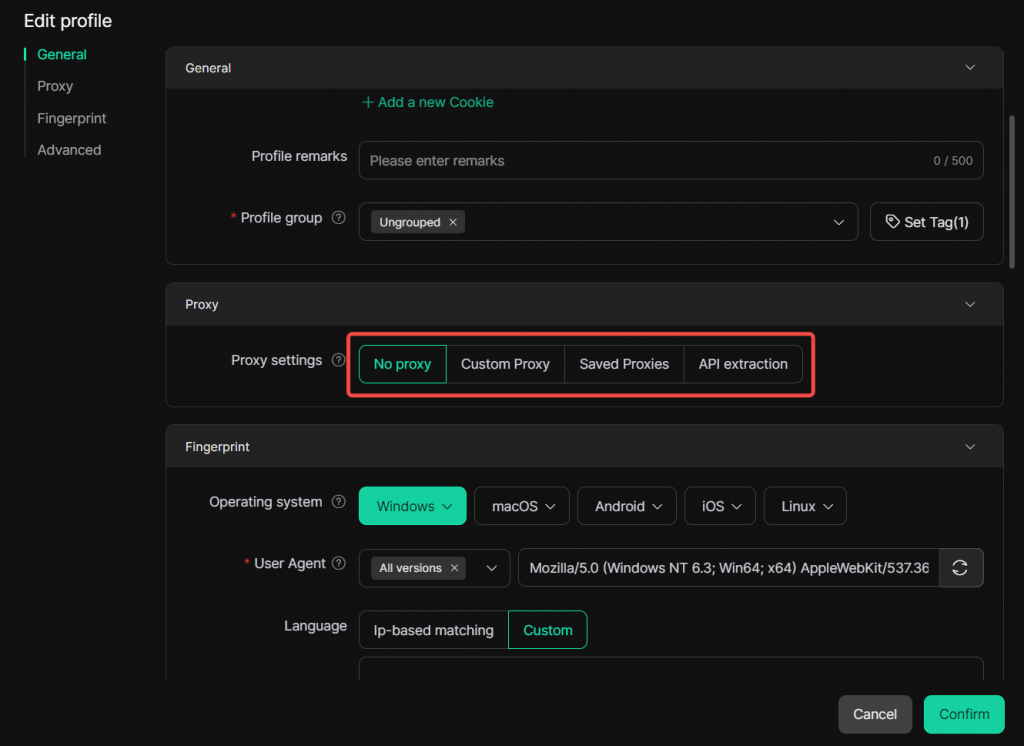1. What Is a Proxy?
A proxy is a server that acts as an intermediary between your device and the internet. The proxy server sends your requests to the target server and returns the responses to you. In this way, the target server views the IP address of the proxy server instead of your real IP address. Proxies help you hide your true identity, access restricted content, and enhance online security.
2. What Are the Types of Proxies?
- HTTP Proxy: It’s generally used for HTTP protocol but it can only handle web browsing requests and cannot process other types of network requests.
- HTTPS Proxy: It’s generally used for HTTPS protocol, supporting encrypted web browsing requests, suitable for scenarios requiring secure transmission.
- SOCKS Proxy: A general-purpose proxy that can handle various protocols and any type of traffic (e.g., HTTP, HTTPS, FTP). SOCKS5 is the most popular version, supporting authentication and UDP traffic.
- Transparent Proxy: This proxy passes your real IP address to the target server, so it cannot hide your identity.
- Anonymous Proxy: This proxy hides your real IP address, but the target server can still tell that you are using a proxy.
- Elite Proxy (High Anonymity Proxy): This proxy not only hides your real IP address but also disguises itself as a regular user, making it undetectable when you are using a proxy.
3. How Should I Choose a Proxy?
You should consider the following aspects before making a decision:
- Security: Choose a proxy that supports encrypted transmission (such as HTTPS or SOCKS5) to protect your data from being stolen.
- Speed and Stability: High-quality proxy servers should have low latency and high stability to avoid affecting your browsing experience.
- Anonymity: Choose the appropriate level of anonymity based on your needs. You can select an elite proxy for high anonymity.
- Location: Choose the proxy server location based on the content you need to access. For example, in order to access content restricted to a specific country/region, you need to select a proxy server in that area.
- Reputation and Reliability: Choose a proxy service provider with a good reputation and reliability to ensure service quality and dependability.
4. Can I Use the Internet Without a Proxy?
Yes, if you do not need to hide your identity, bypass geographical restrictions, or enhance online security, you don’t need to use a proxy then. Simply select “No Proxy (Local Network)” when creating browser profiles. However, using a proxy can provide extra privacy protection and enhance security, especially while using a public network or when accessing restricted content.

5. What Types of Proxies Does DICloak Support?
DICloak supports HTTP/HTTPS/SOCKS5 and IPFLY/922S5/IPRoyal/Netnut (dynamic proxy) types. You can choose the appropriate proxy types based on your needs to enhance your user experience and security.
6. Why Do We Need to Configure a Proxy in DICloak?
Configuring a proxy in DICloak offers the following benefits:
- Privacy Protection: Proxies can hide your real IP address, protecting your online privacy.
- Bypass Geographical Restrictions: By using proxies located in other countries or regions, you can access geographically restricted content.
- Increased Security: Through encrypted transmission, proxies prevent your data from being stolen, especially when using public Wi-Fi.
- Prevent Tracking: Combining proxies with Antidetect Browser can prevent online tracking and enhance anonymity in a more effective way.
- Manage Multiple Accounts on One Device: You can create multiple browser profiles in DICloak and configure independent proxy IPs for each browser profile, avoiding detection of linked accounts and keeping your accounts away from bans.
7. What Should I Do If My Proxy Connection Fails?
If your proxy connection fails, try the following troubleshooting steps:
- Check Proxy Settings: Ensure the proxy server address, port number, and authentication information (if any) are correct.
- Test the Proxy Server: Use other tools (like a browser or proxy testing website) to verify if the proxy server is working correctly.
- Switch Proxy Servers: If the current proxy server is unavailable, you can try another proxy server.
- Check Network Connection: Ensure your network connection is normal, ruling out any network failures. It is important to note that within mainland China (excluding Hong Kong, Macau and Taiwan), direct access to foreign IPs is generally restricted. Therefore, if you use DICloak to configure an overseas IP proxy within mainland China (excluding Hong Kong, Macau and Taiwan), you need to set up an international network access first by using methods like VPS/international dedicated lines/VPN to connect and access overseas IPs on DICloak.
- Contact Proxy Service Provider or DICloak Support: If the problem persists, you can contact the proxy service provider or DICloak support for assistance and help.